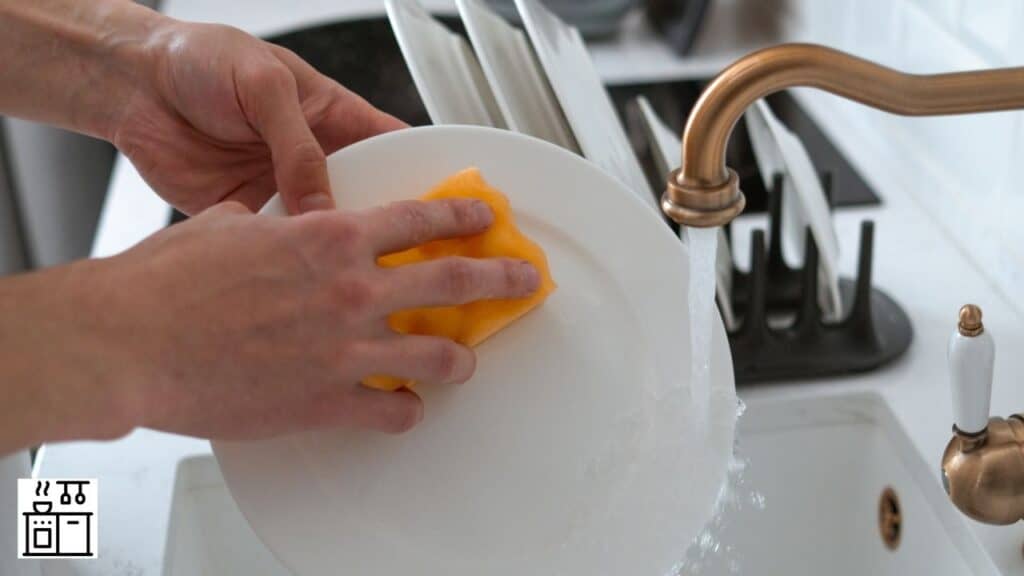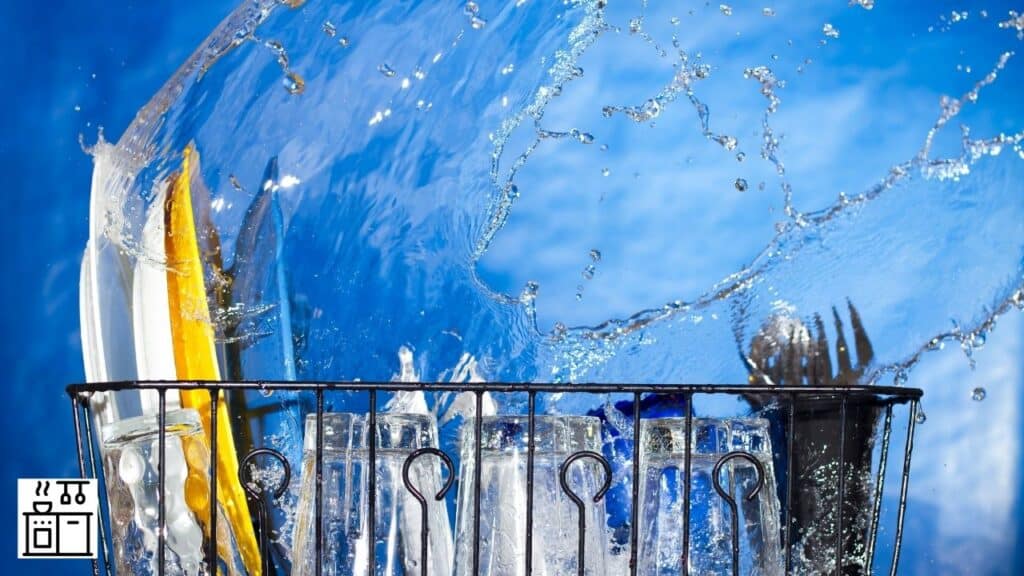Judging by the size of dishwashers, you may assume that these appliances consume a lot of water. Many people even avoid buying a dishwasher and resort to handwashing dishes for this reason. But are dishwashers more water-efficient?
Yes, standard dishwashers are more water-efficient. These dishwashers use anywhere between 3 to 10 gallons of water for a full load of dishes on a normal cycle. This is considerably less than the water needed to handwash the same load. Energy Star dishwashers use even less water for normal cycles.
Let’s now take a detailed look at this.
How Much Water Do Dishwashers Use?
Whether it’s to reduce your water bills or an effort to be more environment-friendly, water consumption is a smart move.
Dishwashers are convenient household appliances because they free up the time spent washing up after meals.
However, how do they compare with handwashing in terms of water consumption?
Various studies suggest that dishwashing is indeed more water and energy-efficient than handwashing.
You may find this a little difficult to accept because standard dishwashers are big and bulky equipment.
They may look like they need a lot of water. Interestingly, it’s not so.
Dishwashers don’t fill up with water but use water sprays to clean the contents.
These appliances use the combined effect of strong jets of hot water and detergents to cut through food residue and stains.
Now, a standard dishwasher can hold a full load of nearly 144 items.
According to one research by the University of Bonn, it can clean this entire load with just 13 liters of water.
However, if you had to clean the same load by hand, you would have to fill and empty the sink multiple times.
Now, your sink may hold 15 to 45 liters of water at a time.
So washing this load would need at least 100 liters of water.
Despite using more water, the quality of results may still be inferior to that of the dishwasher.
Let’s also not forget the amount of time and labor you must spend to get through the task.
Recommended Further Reading:
- Is Investing in a Dishwasher Worth It?
- Investigating Why Dishwashers Take So Long
- Is Hardwiring Required for Dishwashers?
How Do Dishwashers Reduce Water Consumption?
A combination of factors allows dishwashers to reduce overall water consumption.
These appliances are designed to clean dishes thoroughly while optimizing energy and water consumption.
They have multiple sensors to detect the water level and prevent overflow and wastage.
These sensors can also detect how dirty a load is.
They use this information to decide if a dish is clean or needs further rinsing and cleaning.
But how does a dishwasher clean dishes without soaking them in water?
Dishwashers don’t fill with water. There is a small basin at the base that fills with water.
The heating element in a dishwasher heats this water.
The heated water moves up into the spray arms, which spray it on the dirty dishes.
These sprays dislodge food residue from the plates and dissolve any oily residue by using hot water and strong force.
The spray arms also rotate to move water in all directions.
The food that comes off the dishes falls to the bottom.
Here, they collect in a filter and are either disintegrated or disposed of.
The washing and rinsing process continues until the water coming out of the dishwasher is clear.
By now, you must have realized that there is no soaking or scrubbing involved.
This reduces the need for water.
Dishwashers depend on hot water to cut through the grime and efficiently dislodge food scraps.
So water usage is reduced further.
Related Further Reading:
- Are Bosch Dishwashers Good? (8 Reasons Why They Are)
- What Dimensions Do Dishwashers Come In?
- Do Freezers Produce Heat? (Where Does The Heat Come From?)
Do Dishwashers Always Use Less Water Than Handwashing?

You may have noticed that dishwashers have different device settings.
Normal cycles are usually enough for daily loads.
Running a full load is the most efficient way to use a dishwasher.
If you run the device with a smaller load on a normal cycle, it would need the same water and energy to get through the load.
So the water and energy consumption would be higher than is actually required for the load.
Some models include partial load and express wash options.
These settings allow you to cut down the time and resources.
Nonetheless, most devices are designed for optimal operation at normal cycles and full-load capacity.
So it’s always better to wait till your dishwasher is full to run it.
Some dishwashers also have advanced cleaning options like pre-soaking and extra-rinse.
These cycles use more energy and water than regular cycles.
Nonetheless, it would still be more energy and water efficient than doing these tasks by hand.
Do New Dishwashers Use Less Water?
Dishwashers built before 2013 use more water than their modern counterparts.
Changes to the federal guidelines regarding energy and resource consumption are responsible for this difference.
As per the new regulations, dishwashers and other appliances using water should optimize the designs.
They should use the exact amounts of water and energy they need to produce good results.
These guidelines focus on reducing wastage by improving design features.
To meet these requirements, manufacturers had to revise their original dishwasher designs.
Thus, they came up with the idea of using less water but increasing the cycle length to deliver the same level of cleanliness by minimizing resource and water usage.
New dishwashers use 3 gallons of water per cycle on average. It may vary slightly based on the setting.
Nonetheless, it’s a big step down from the amount of water used by older models.
The Department of Energy calculates the saving due to design changes as nearly 5000 gallons per year per device.
Meanwhile, conventional dishwashers built before 2013 used nearly 9 to 14 gallons of water for similar loads.
New dishwashers with energy star ratings use even less water.
These machines are optimized to deliver high-quality results using minimum energy and water.
Many of them even have an eco-setting that allows them to wash dishes at a lower temperature and use less water.
The dishes will still turn out looking clean and properly sanitized.
Interesting Further Reading:
- Can a Dishwasher and Disposal Share a Circuit?
- Do Refrigerators Have Air Filters? (Where Are They Located?)
- Can a Rice Cooker Replace an Instant Pot?
Is It Always Better To Use A Dishwasher?
Although dishwashers are a blessing when it comes to saving water, energy, and effort, handwashing will always have its place.
Every kitchen will have a few items that can’t go in a dishwasher—for instance, your precious cast iron cookware or wooden chopping boards.
These don’t belong in a dishwasher, and you have no other option but to clean them by hand.
Dishwashing may also not seem practical when you have only a few dirty dishes.
As we mentioned earlier, it’s best to run a dishwasher with a full load.
Unless your dishwasher has a half-load setting or express cycle option, running the dishwasher with a few dishes may not make sense.
In this case, you are better off washing up the dishes in the sink.
Nevertheless, it’s not the best approach from an environment-friendly perspective.
Doing small batches of dishes several times a day can add up quickly.
Over time, it will contribute to your water and energy consumption and negate the benefits of owning a dishwasher.
It’s better to only handwash what is absolutely urgent and wait until you have a full load to wash the rest of the dishes.

